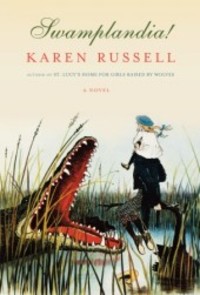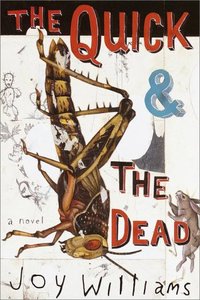
In our continuing series of guest blog posts by writers of fiction, history, essays, and poetry, Karen Russell, whose first novel Swamplandia! was just published, shares what reading the American writer Joy Williams has taught her.
When I started writing weird Florida tales in graduate school, more than one person was appalled that I hadn’t read any Joy Williams. And they were so correct—I had been deeply remiss. More than the setting of her work—some of which does indeed take place in the queer light of Florida, as well as New Mexico and Arizona and Maine—I was amazed by the emotional states Joy Williams could imprint so fluidly on the page. Unlike any other writer I know, she can render the interior slide from grief to strange cravings to jokey observation to superstitious fears, all in the span of a single paragraph, or even sentence. Her leaps floor me: she sails with a freakish grace from poignancy to sarcasm, or from one character’s fantasy to another’s nightmare, or from a kitschy deer-foot lamp to a disagreement with Kierkegaard. Nobody in her stories behaves the way you expect and yet somehow even their craziest actions feel inevitable, preordained. When I read her, I feel like I’m in direct contact with the deep irrationality of our species.
That you could have this kind of unmediated contact with a character’s interiority came as a revelation to me. I saw that Joy Williams had an almost musical gift for holding the minor key note, whereas in my fiction I tended to overexplain like a teenager caught out after curfew. My goony first-person narrator would wind up offering some kind of Cliff’s Notes to his own story (“You’re probably wondering why I did that just now. Well, when I was six years old, I had a bad experience with a waffle…”). Wow, I thought, as a writer you don’t have to explain everything—you don’t have to recruit your character’s feelings and line them up across from your character’s actions, with the black-and-white symmetry of a chess game. In Joy Williams’s stories, action and motivation rarely connect in a safe or sane way. This disconnect makes her stories come off as robust and dangerous as real life.

For me, so much of the humor and the tragedy of her work come from watching her characters act contrary to all of their stated interests. You get a whiff of this from the first line of her fantastic novel The Quick and the Dead, which begins “This was no place to be tonight for any of them, but this was the place they were.” (I should mention that this novel contains, among its cast, three motherless girls, a suicidal pianist, an oracular nurse, and a stroke victim named Ray who believes a monkey is living in the back of his brain).
Williams has respect for every one of her flawed, stung, wildly sympathetic people, including the monkey. She foregrounds the background noise of their mental lives, documenting the chronic percolation of their terrors and desires. Williams showed me that you could allow fictional characters to breathe and live and do some pretty weird things without feeling compelled, as their author, to make biographical or psychological “excuses” for them.
Dialogue, too, in a Williams story, often represents a total failure at connection—it’s an anti-communication, filled with lovers’ outbursts and non-sequiturs, or with megalomaniacal soliloquies where adults railroad children, or bipolar party chatter where “everyone is talking, but who’s listening?” Exchanges as doomed and hilarious as those in a Beckett play fill her books. This speech rarely reads like a realistic transcription of the way that “normal” people talk—but it gets at the primitive forces lunging under language. As she writes: “There is a certain type of conversation one hears only when one is drunk and it is like a dream, full of humor and threat and significance, deep significance.” Mood predominates, and often the actual words spoken feel less relevant than the charge they invite into a room.
Too often I can sense myself trying to cram into dialogue all of my exposition—those terribly linear scenes where characters speak to one another as if they were squinting at a teleprompter. In Joy Williams’s fiction, dialogue reveals unspeakable things—in her story “The Farm,” for example, a couple circles the subject of a child’s death, their real subject, like carrion birds.
Well, this is all to say, thank God for Joy Williams. If you haven’t read her, I hope that my rabid effusions don’t put you off and that you’ll get her stories and novels immediately. She is a true artist of the sentence, one whose poetic sensitivities push into the ultraviolet spectrum. Her work can give you a panoramic view of the Biggest Picture, even as it focuses on microscopic shifts in one character’s mind and heart. Even in her shortest fictions, she writes against a cosmic backdrop: “Why does the writer write?” she asks. “The writer writes to serve—hopelessly he writes in the hope that he might serve—not himself and not others, but that great cold elemental grace that knows us.”
In 2009, three years after the publication of her story collection St. Lucy’s Home for Girls Raised by Wolves, Karen Russell was one of five young writers honored by the National Book Foundation at its “5 Under 35” ceremony; the following year she was included among The New Yorker’s “20 under 40.” Reviewing Swamplandia! in the New York Times Book Review Emma Donoghue wrote, “Vividly worded, exuberant in characterization, the novel is a wild ride: Russell has style in spades.” Russell’s fellow Floridian Carl Hiaasen concurred, “Having spent many days in the Ten Thousand Islands, I was enchanted by Russell’s dream-like descriptions of the tangled and serpentine creeks, the funky and exotic flora, the long stare of circling buzzards. Her prose is both shimmering and stark.”



